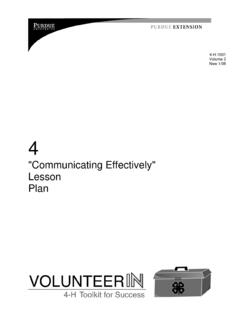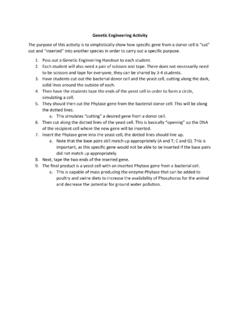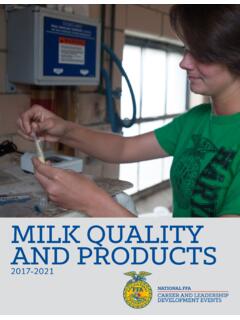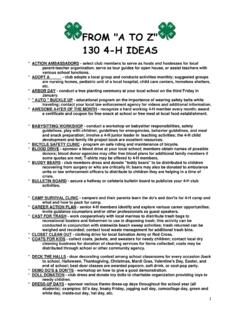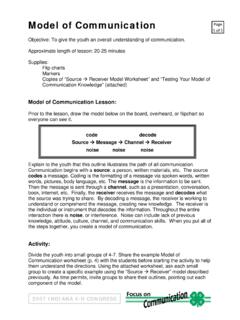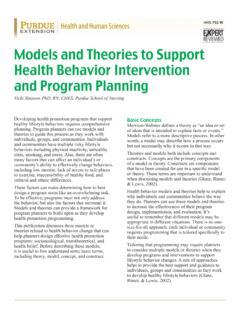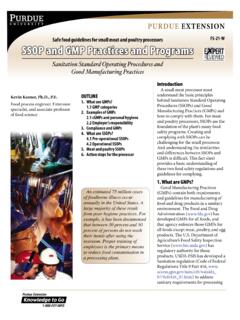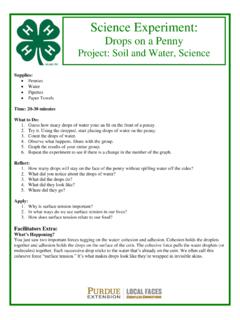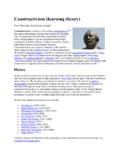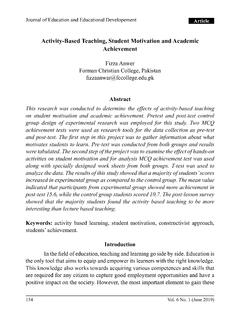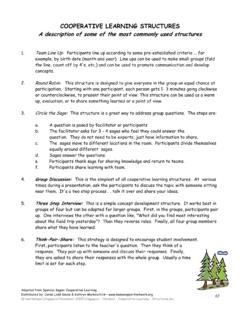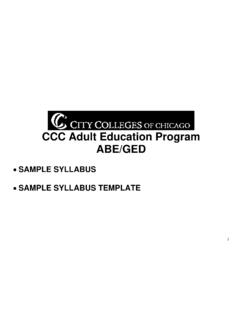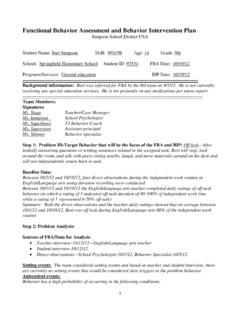Transcription of Ages & Stages of Youth Development 5-8 Years Old Fact …
1 ages & Stages of Youth Development 5-8 Years Old Fact Sheet Physical Growth Early-elementary-age children are at a period of slow, steady growth. They have left behind the rapid changes of the infant-preschooler. The adolescent growth spurt is far away. Five- to 8-year-olds are busy learning how to use their bodies by mastering physical skills. These include everything from small muscle skills like printing with a pencil to large muscle skills like catching a fly ball. Because these skills are not yet polished, craft projects often end up messy, with crooked nails and too much glue. Activities need to be just that active. Provide opportunities to practice skills, but use projects that beginners can complete successfully. Growth in Thinking Early-elementary-age children are moving out of what psychologist Erik Erikson has called a stage of initiative and into the stage of industry.
2 A child at this stage is more interested in the process than in the resulting product; the child is more inclined to continue working on a project than to complete it. (This is just as well, because young children s limited physical ability means that finished products will not be perfect.) Eventually, finishing a project will become as important as beginning it. But don tcount on that just yet. Thinking is concrete at this time. If these children have never seen it, heard it, felt it, tasted it, or smelled it, they have a hard time thinking of it. They also enjoy activities and materials that are real and tangible. Rather than simply giving instructions verbally, you should demonstrate the activity . Doing is important for bothchildren and leader. Another thinking skill that early elementary children are developing is learning to sort things into categories.
3 This skill makes collecting things so important and so much fun at this age. Collecting-type activities can be good for both group meetings and individual projects at this point. Social Growth School-age activities take children away from home and parents, some for the first time, and put them in environments where they face new responsibilities and demands. As children move away from depending on their parents, they need to transfer that dependence to another adult, so the leader may become a central figure to the child. Children are just learning how to be friends and may have several best friends at a time. Boys and girls sometimes enjoy playing together at this age, although by the end of this period a separation of the sexes occurs during most play. Fights often happenbut seldom have lasting effects.
4 The opinion of peers is becoming important. Often, 5- to 8-year-olds care more about being successful when their peers are watching than whenjust Mom or Dad are around. Small group activities are effective, but children still need an adult to share approval. Emotional Growth Early-elementary-age children are wrapped up in themselves. Their thinking capacity does not yet allow them to imagine clearly what other people think and feel. Dramatic play or making believe they are someone else is the way children at this agebegin to build that ability. Five- to 8- year-olds need and seek the approvalof adults, because they are not yet confident enough to set their own at this stage like to play games. Rules and rituals become fascinating, but the children are not yet ready to accept losing.
5 This is why success needs to be emphasized, even if it is small. cooperative games in which every child wins can be especiallyenjoyable at this age. Try to establish some measure of success in every experience to ease blows to young egos. When an activity fails, you can help children by interpreting the reasons behind the failures. learning to cope with problems is a skill you canencourage in 4-H members. The usual 4-H practice of awarding competitive ribbons should be minimized or avoided here. Competition with others is inappropriate for 5- to 8-year-olds. Characteristics: Teaching Tips: Thinking is in the here and now ("concrete" thinkers). Youth need real experiences to span is about 20-30 the length of activities based on how interested the Youth appear.
6 Begin to develop friendships, usually with Youth of the same sex. Plan activities that Youth can do in groups rather than to be liked and to please adults and are easily motivated. Let Youth know when they have done a good job and use that encouragement to keep them best when physically active; however, competitive activities are less appropriate. Allow Youth to participate in activities where they can use physical energy and are cooperative . Have a special attachment to older Youth to choose an older Youth to be their helper and role model. Differentiation between fantasy and reality can be difficult. Build in transitions and discussions to help distinguish the imaginary from the interested in process than product. Interested in doing activities other than creating a specific product or doing well in the activity .
7 It is okay for 5-8 year olds to work on a project and not complete it. Are naturally curious and want to make sense of the world. Allow for exploration and spontaneity in activities. Learn to sort things into categories. Encouraging them to collect things. Tips: Give clear and specific instructions Plan a variety of activities where success can be experienced Reading to this group is effective and enjoyed Plan activities that take a short time to complete and build on previous experiences Provide varied short and specific learning activities involving concrete concepts focus onthe doing instead of the finished product Move quickly from one activity to another alternate moderate and high activity with low Set up situations that foster cooperation and teamwork rather than competition Plan for small group activities with an adult for each three to four learners Utilize field trips, real models.
8 And hands-on experience Provide activities that encourage physical activity such as running, moving, playing games,cutting with scissors, painting, pasting, brushing, and assembling Help create opportunities for learners to share toys, time of an adult, time for otherlearners to speak, etc. Plan for and encourage free time Provide immediate positive encouragement and assistance Consider alternative ways of expressing things learned, feelings felt, etc. during theactivities writing stories, drawing pictures, etc. Ask learners what questions they have help them predict answers to their questions Ask learners to talk about how activities went for them fun, boring, easy, hard, new, havedone before Think about senses used in the activities ask which things smelled the best, tasted thesweetest, felt the softest, etc.
9 If a sequential process was used, have learners name the steps completed in the process Ask learners how caring for others was demonstrated in their group during the activities Ask learners to tell you what they heard fellow group members say in the activities If problems happened in the activities, ask learners why they occurred and what couldhave been done differently to avoid them Ask learners what surprises they observed in themselves and in others If supplies were used in doing activities, ask learners what other supplies they could use when doing the activity again.
